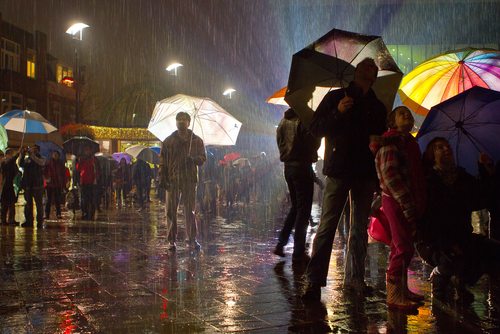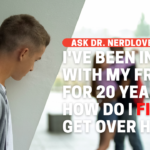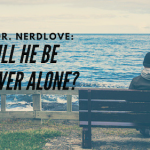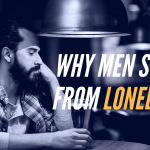A serious question for you: how often do you feel lonely? Not spending time alone but actually feeling lonely and isolated. It happens to all of us from time to time – we find ourselves on our own at a time when we’re craving a connection with someone. We feel lonely when we move to a new city or when we’re between relationships; when we go home for weekends and we have nobody to spend time with. We may feel especially cut off when we see all those happy couples and groups of friends out and about and having a good time.

Most of the time, loneliness is fleeting. It’s a temporary feeling, something we know is going to pass with time. The loneliness that comes after a break-up or a loss prompts us to reconnect with others. But for many of us, being lonely is something we feel all the time, a state of being rather than a momentary issue. And that chronic loneliness can actually hurt us over time.
That’s not hyperbole. Beyond the health issues that arise from social isolation, feeling chronically lonely triggers changes in us on the cellular level that can suppress our immune system, cause inflammation reactions and leave us more vulnerable to infection and disease. So, how do we overcome that loneliness?
Being Lonely Isn’t About Being Alone
One of the mistakes we make when we feel lonely is that we assume that loneliness corresponds with being by ourselves. Humans are social animals after all; it makes sense that we associate physical isolation with social isolation. However, when we try to combat loneliness, we tend to try to fill that void in our life by surrounding ourselves with people in different ways… many of which don’t work. As many a sufferer of chronic loneliness can tell you, it’s entirely possible to be lonely even when you’re in a crowd.

One of the most common ways people try to combat loneliness is, paradoxically, one of the least successful: they charge headlong into relationships.
On the surface, it seems as though finding a partner would be an instant loneliness cure. You’re sharing your life – or at least part of it – with another living, breathing person! How is this not a solution to being lonely? Well, because the problem isn’t a lack of physical bodies in your immediate proximity, it’s a lack of connections. In fact, in several studies of adults who report being chronically lonely, 62% of them are married and actively living with their spouse. They may be living together, but their lives are separate, devoid of intimacy or affection. In many cases, they routinely end up isolating themselves from one another. Having space is one thing; routinely spending time on the computer or XBox while your partner reads in another room is a recipe for loneliness.
For those who treat relationships as a cure-all for being lonely, it’s a cruel irony; in trying to avoid loneliness, they end up making things worse.
The key to beating loneliness isn’t about the quantity of the people in your life, it’s about the quality of your connections with people. Having a vast array of connections with people means very little when there’s no substance to them. Facebook and social media are a prime example of how connectivity can paradoxically lead to being even lonelier. Having hundreds or thousands of friends and followers may feel like an embarrassment of riches, but they don’t feel “real” to us. They simply don’t matter when the majority of our interactions involve simple “likes” or lol’s or vacuous comments on Instagram posts.
You don’t need hundreds or even dozens of friends. You just need a few close confidants. Even three or four strong social connections can make the difference between being lonely and alone.
So how do you do this?
Find Your Community
One of the keys to the human experience is our drive to belong. Even among the most solitary introverts, there’s a need to find our team, our tribe, as it were. It’s within that community that we can find the people we can connect with. The interests we share with that community provide commonalities with the other members, one of the most important factors in connecting with people. The key, of course, is to find that community in the first place. Part of why we feel lonely is that we aren’t sure where to find our people, especially as we get older. It’s easier in high-school and college, when you’re all but guaranteed to be surrounded by people in the same place in life as you. As we get older, we no longer have that sizable pool to draw from. Those instant commonalities become thin on the ground.
Instead, we have to rely on other ways of finding our tribe. Social organizations as diverse as motorcycle clubs and the Juggalos provide us with the same sense of brotherhood and community that used to be fulfilled by fraternities and sports teams.

That’s why you need to connect with your passions. The easiest way to find people who make up your tribe is to engage with the things you already love. The trick is to do so in ways that bring you together with others. This may require a certain level of creativity at times. If you’re into more solitary pursuits like writing, art or coding, you want to find groups or related meet-ups. Is there a writer’s workshop that meets near you? Perhaps an artist’s pub-crawl? Other times you may need to expand your horizons. If you live in a smaller town, you may need to branch into areas that are related to your interests. You may not find a lot of otaku in your area, but there might be groups dedicated to studying Japanese or hunting Pokemon.
Remember: social media can help with finding your tribe, but don’t rely on it exclusively. If you possibly can, you want to be interacting with people in person. Facebook, subreddits and web forums are great, but they can also be a crutch. Try to find groups that meet face to face, if at all possible.
Don’t go into these groups expecting to instantly find your new best friends… but don’t sweat it if you don’t bond instantly, either. Those shallow social connections are how you start fostering new friendships. Even if the people you meet aren’t your brothers or sisters, they may be the ones to connect you to the people who are.
Another thing to keep in mind: you may need to be the one to take the initiative. If a group matching your interests doesn’t exist, you may as well be the one to create it. Taking an active hand in building your community forces you to get involved with others and connect in ways you might not otherwise.
In fact, speaking of getting active…
Get Involved
One thing the chronically lonely often have in common: their isolation is partially self-inflicted. It’s not intentional; more often than not, we don’t recognize how we’re shutting others out. As a society, we have developed a trend of trying to dodge social situations if they’re not just right. We pass on going for drinks with our coworkers or taking part in the office Super Bowl party. We bail on friends and families’ group outings and skip meetings and get-togethers we don’t need to go to. Sometimes it’s because we don’t feel like we relate to our peers. Other times we worry that we’d be awkward or out of place. Sometimes it’s a matter of energy; an introvert may only want to handle so much socializing. Other times we simply would rather do something else.
Regardless of the reasons, we end up in the same place. In dribs and drabs, we cut ourselves off from others and send the message of “don’t bother me,” even when we desperately crave those connections. Without even intending to, we’ve walled ourselves off from the very people who might try to connect with us.

If you want to overcome your loneliness, you have to start breaking yourself out of that cycle, even if it’s in small ways. You have to be an active participant in your own life and the world around you; people will only try so hard to reach you before they assume that this is the way you want it. Well… you get it.
Just as you may have to take an active role in finding your tribe, you may have to be the one to get the social ball rolling. Somebody’s got to make the first move. It may as well be you. If people aren’t inviting you to socialize after work – or it isn’t part of the work culture (yet) – you can make the first move and invite folks. You can be the one to propose or organize events. It’s nice to be invited, but you can’t count on it. Do you run the risk of nobody showing up? Sure… but then you’re in the same boat you were before. You’ve still taken steps to take control of your life, instead of living passively.
Getting involved in your life means taking risks to be social. You may have to put yourself into situations that you aren’t 100% comfortable with at first. You may have to make awkward small talk in the beginning. There may not be anyone you know well enough to talk to; that’s fine. You may not have anything to say… so just listen instead. Ask questions and get other people talking.
And in a worst case scenario: step outside your day to day life. Volunteer at the local pet shelter. Take part in a city beautification project. Work with Habitat for Humanity. Force fate’s hand and put yourself in the path of more social occasions, instead of waiting for them to come to you.
Reach Out And Touch Someone
One issue that actually contributes to feeling lonely is cultural; American society is very hands-off. We treat casual touching outside of a romantic relationship as weird. This is a relatively recent development too; casual physical affection between friends used to be the norm. Now however, casual physical contact is something to be avoided. Even phrases like “touchy-feely” drive home the idea that touching others is unusual and off-putting.
But as odd as it may sound, the fact that our culture discourages platonic touching can drive feelings of isolation and loneliness through the roof. Touch is actually shockingly important as a means of connecting and communicating with others, as well as for basic health. Touch stimulates oxytocin production, while hugging lowers blood pressure. Infants who aren’t touched enough get sick and die; they develop a condition known as “failure to thrive” and cease growing even when they get sufficient nutrition. Touch is also important in adults, for our health and emotional well-being. and adults tend to be the most touch-deprived. Some scientists refer to the emotional withdrawal that comes from a lack of touch as skin-hunger – a need for affection and connection with others that becomes so intense that it can manifest in unusual and often maladaptive ways.

Many intensely lonely people look to find simple human contact in a number of ways. Almost every sex worker out there has clients who simply want to be held instead of sex. Scientists and sociologists suspect that other behaviors, like compulsively visiting strip clubs, pursuing casual sex partners or even drug addiction may have origins in simply looking for simple human affection.
For people who are looking to overcome their loneliness, a little more casual contact can be the thing that helps make the difference. Getting that touch, however, can be tricky. Because of cultural practices, most friends don’t touch outside of brief handshakes or semi-ritualized gestures like fist pounds or friendly shoulder-checks. People who are touch deprived do have options, however. Massage therapy, for example, can be a valuable source of comfort for someone who feels touch deprived. In addition to the benefits to muscular system, massage can help the body stimulate oxytocin and aleve feelings of stress and tension. In some cities, professional cuddling organizations offer platonic1 snuggling for people who need it. If that sounds odd to you, consider how disconnected people feel that there’s a market for this service.
But at the end of the day, one of the most important things you can do to increase the amount of touching you give and receive is, simply, to model the behavior you want to see. Getting more comfortable with giving casual touches, whether simple pats on the arm or hugs amongst friends, helps set the tone amongst your social circle and invites reciprocity. Yes, it can feel a bit awkward. But as with most aspects of overcoming loneliness: someone has to make the first move. It may as well be you.
Reach Out
You may have noticed an overarching theme to these tips: you have to be proactive. As much as we would love for others to see that we’re lonely and reach out, we can’t rely on others to intuit our needs. Frankly, most of us are caught up in our own bullshit. We rarely notice what’s happening with our friends because we’re in our own worlds. And if you’ve been turning down other people’s overtures… well, people will eventually assume that this is what you want.
If we want to overcome loneliness, we have to make the first move and seek out what we need. It doesn’t need to be a production, nor do you need to connect with everyone in your life. Quality in your connections is far more important that quantity. Even two or three close friends can make the difference between being happy and feeling chronically lonely.
In this, as in most aspects in life, you have to be your own advocate. Asking for what you need can feel awkward or strange, especially when you crave a connection with others. In practice however, it’s easier than you can imagine. Wanting to connect with others is one of the most primal human desires. Put in the effort to foster the friendships and intimacy you need and you’ll find that your lonely days will be a thing of the past.

Related Posts
- although the first photo on the site suggests otherwise… yeep. [↩]






